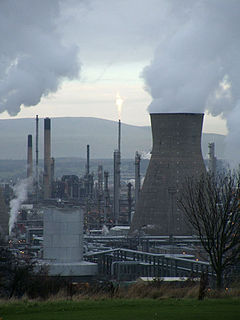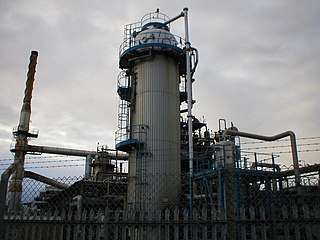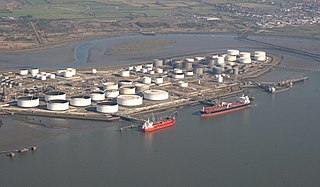A refinery is a production facility composed of a group of chemical engineering unit processes and unit operations refining certain materials or converting raw material into products of value.

Teesside is a conurbation around the River Tees in the north of England. The name was initially used as a county borough in the North Riding of Yorkshire. It is common to see Teesside incorrectly spelt as "Teeside", with a single 's'. The term was initially for a smaller area but has came to be used for larger built up area, with more settlements that are also on the side of the Tees.

Tees Valley is a combined authority area in the north of England around the River Tees. The combined authority was established in 2016, after public consultation in 2015. The area is not a geographical valley.
Phillips Petroleum Company was an American oil company incorporated in 1917 that expanded into petroleum refining, marketing and transportation, natural gas gathering and the chemicals sectors. It was Phillips Petroleum that first found oil in the North Sea on December 23, 1969, at a position that was later named Ekofisk.

The United Kingdom petroleum pipeline network is principally made up of three pipelines systems: the former Government Pipeline and Storage System (GPSS) now the CLH Pipeline System; the Esso pipelines, and the United Kingdom Oil Pipelines (UKOP) and associated pipelines. There are also several other lines including the Fina line built around 1990 that runs from North Lincolnshire to the Buncefield oil depot near Hemel Hempstead.

An oil terminal is an industrial facility for the storage of oil, petroleum and petrochemical products, and from which these products are transported to end users or other storage facilities. An oil terminal typically has a variety of above or below ground tankage; facilities for inter-tank transfer; pumping facilities; loading gantries for filling road tankers or barges; ship loading/unloading equipment at marine terminals; and pipeline connections.

Stanlow Refinery is an oil refinery owned by Essar Energy in Ellesmere Port, North West England. Until 2011 it was owned by Shell UK. The refinery is situated on the south bank of the Manchester Ship Canal, which is used to transport seaborne oil for refining and chemicals for Essar and Shell.

Teesport is a large sea port located in the unitary authority of Redcar and Cleveland, in the ceremonial county of North Yorkshire, Northern England.

Seal Sands is a 294.37 hectare biological Site of Special Scientific Interest in County Durham, England, notified in 1966.
Norpipe is the undersea oil and natural gas pipelines system in the North Sea. It supplies oil from the Norwegian Ekofisk and associated fields in the North Sea to the United Kingdom and natural gas to Germany.

Petroplus Holdings AG was Europe's largest independent oil refiner by capacity. When the now defunct company was first formed in 1993, it was known as Petroplus International N.V., and was based in the Netherlands. In August 1998, it was listed on the Amsterdam Stock Exchange. In April 2005, it was delisted from the Euronext Amsterdam stock exchange when the company was acquired by a holding company. In November 2006, the company went public on the Swiss Stock Exchange.

Coryton Refinery was an oil refinery in Essex, England, on the estuary of the River Thames 28 miles (45 km) from central London, between Shell Haven Creek and Hole Haven Creek, which separates Canvey Island from the mainland.

Shell Haven was a port on the north bank of the Thames Estuary at the eastern end of Thurrock, Essex, England and then an oil refinery. The refinery closed in 1999 and the site was purchased by DP World who received planning consent in May 2007 for the new London Gateway deep water container port at the site. The neighbouring Coryton Refinery remained in operation until 2012.

The Central Area Transmission System is a natural gas transportation and processing system that transports natural gas through a 404 kilometre pipeline from the Central North Sea to a reception and processing terminal at Teesside in the North East of England.
Western Refining, Inc., is a Texas-based Fortune 200 and Global 2000 crude oil refiner and marketer operating primarily in the Southwestern, North-Central and Mid-Atlantic regions of the United States. Western Refining (WNR) has been publicly traded on the New York Stock Exchange since January 2006 and is the fourth largest publicly traded independent refiner and marketer in the nation. Western Refining has been acquired by Tesoro another independent petroleum Refining and marketing corporation.

Grangemouth Refinery is a mature oil refinery complex located on the Firth of Forth in Grangemouth, Scotland, currently operated by Petroineos.

Eastham Oil Terminal is situated close to the small town of Eastham on the Wirral Peninsula, beside the Manchester Ship Canal. It was commissioned in 1954 close to the Queen Elizabeth II Dock and is a storage and export facility for oil products refined at Stanlow Refinery, to which it is connected by pipeline. The site is currently operated by Nynas.

Petroleum refining in the United Kingdom produced around 61 million tonnes of petroleum products in 2015, down 19% from 2011. There are six major and one smaller petroleum refinery in the downstream sector of the UK oil industry.
Oil terminals are key facilities for the import, export, storage, blending, transfer and distribution of oil and petroleum products. Many terminals are located at coastal sites, such as Teesside and the lower Thames, to allow the offloading and loading of coastal shipping. Inland terminals, located around major cities, such as Birmingham and Manchester, facilitate the distribution of products to local industrial and commercial users. Many terminals have road tanker loading equipment for local distribution of products such as petrol, diesel, and heating oil. The terminals are connected through a network of underground pipelines to enable the transfer of oil and refined products across Britain.
The Teesside oil terminal is a major crude oil reception, processing, storage and export facility at Seal Sands, Middlesbrough. It receives and processes crude oil delivered by the subsea NORPIPE pipeline from the Norwegian Ekofisk field and the UK Fulmar and J-Block fields. The terminal includes facilities for exporting stabilised crude oil and liquefied petroleum gases (LPG) by tanker and pipeline.















